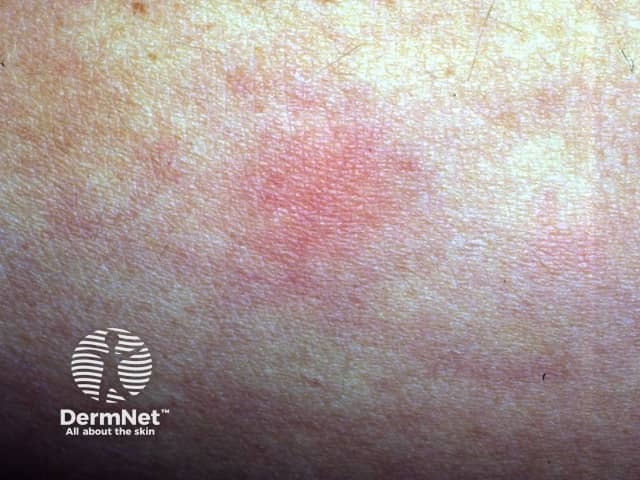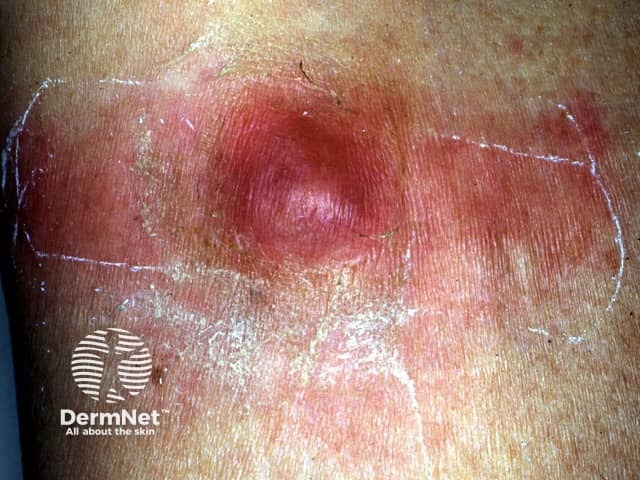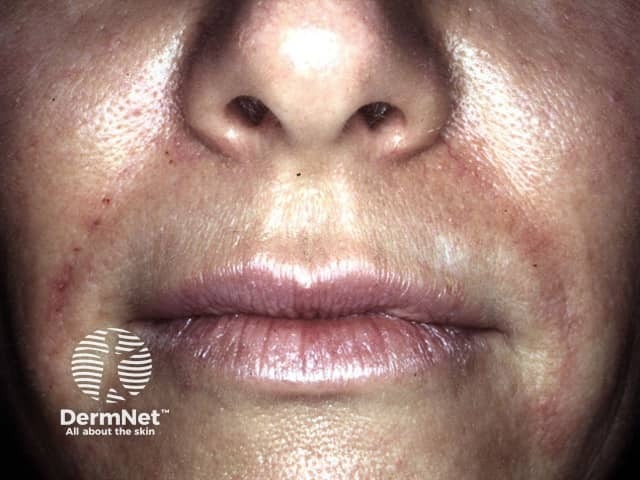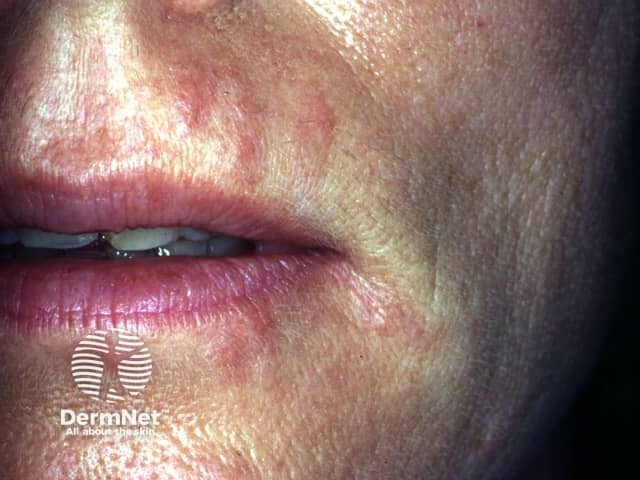Main menu
Common skin conditions

NEWS
Join DermNet PRO
Read more
Quick links
Author: Vanessa Ngan, Staff Writer, 2002. Updated by Amanda Oakley, 2004
Introduction
Introduction - collagen
Collagen implants
Demographics
How it works
Duration of collagen implants
Side effects
Collagen replacement therapy is a safe, non-surgical procedure that softens lines and furrows on the face.
Tiny quantities of collagen are injected under the line or scar through very narrow guage needles, boosting the skin's natural collagen. The effects can be maintained by small ‘top-up’ collagen injections two or three times a year.
Collagen is a natural substance that is found in skin, muscle, tendons and bones and provides structural support. In the dermis (the mid-layer of skin), collagen is made by fibroblast cells. It forms a fibrous network on which new cells can grow. Through the natural processes of ageing, collagen in the dermis is gradually lost and contributes to the formation of facial lines.
Injectable bovine collagen is made of sterile, purified collagen from cow skin. Human collagen implants are highly purified and isolated from human skin grown in a laboratory. The cells have been grown for the last ten years or so primarily to manufacture living skin-equivalents to treat burns and ulcers.
When injected into the body's skin both forms of collagen are accepted as if they were the body's collagen, forming a network of collagen fibres.
Zyderm® and Zyplast® are popular brands of injectable bovine collagen. Others include Resoplast®. Human collagen brands include Dermalogen®, Cymetra™, CosmoDerm® and CosmoPlast®.
Zyderm® and Cosmoderm® are used for fine lines, and Zyplast® and CosmoDerm® are used for deeper furrows.
There are also products derived from porcine collagen, including Evolence™, and Fibrel®. Fibrel is injected with the patient's serum. The injections are said to be rather painful and may cause allergic reactions.
A person's skin may be used to produce fibroblast cultures (Isolagen®) or a suspension of collagen (Autologen®). It can also be mixed with synthetic PMMA beads (Artecoll®).
Collagen injections can be used to improve the skin's contour and fill out depressions in the skin due to scars, injury or lines.
Facial lines and features that can be smoothed out using collagen implants include:
Collagen treatment can be combined with other cosmetic procedures, including botulinum toxin injections and laser resurfacing.
Your doctor will take a complete medical history. Medication that reduces blood clottings, such as aspirin, anti-inflammatory agents, warfarin and some herbal medications, may increase the chance of bleeding. People with severe allergies (anaphylaxis) or allergy to injected local anaesthetics should not be treated with bovine, porcine or human collagen.
Since injectable bovine collagen is derived from cows, it may cause allergic reactions. Approximately 3% of the population is allergic to bovine collagen; these individuals should not receive these implants. Human collagen is a better choice in the following circumstances:
To see if you are eligible for bovine collagen replacement therapy you will require one or two skin tests. No skin test is necessary for human collagen as allergic reactions are very unlikely.
Procedure for a collagen skin test

Positive collagen test

Abscess formed 2 months after
Collagen treatments are carried out in a medical centre by a specially trained nurse or doctor. The treatment usually takes 20 minutes to an hour.
Procedure for collagen replacement treatments
Immediately after injection, the site may be tender, red and swollen. This will gradually settle over the next few days. It is safe to cover the treated areas with make-up if you wish. Avoid strenuous exercise, sunburn and alcohol during this time. Your therapist may ask to check the results in 2 or 3 weeks and top up with more collagen if necessary.
Collagen implants are not permanent. Because collagen is a natural protein, it slowly breaks down into amino acids that are then absorbed by the body. In most cases, implants last anywhere between one to six months, although in some people one implant may be sufficient for up to two years. Repeat treatments will be necessary to maintain the results.
The longevity of the implant will depend on its location and individual response. Muscular activity such as smiling and frowning will reduce how long it lasts. Conversely, it may last longer than expected in scars because these are not caused by facial muscle movement.
At the time of treatment, most patients report minor discomfort. This is minimized by the addition of lignocaine (lidocaine) to the collagen preparation. This is local anaesthetic to numb the treatment area and is known as ‘lidocaine’ in America.
Immediately after treatment, the area may be red, swollen and tender; this usually improves over the following days. Temporary bruising and discolouration may also occur. The collagen is sometimes visible for a while in the form of small white bumps at the treatment site but generally smoothes out within a few weeks.
Very rarely, if a blood vessel is accidentally blocked by the collagen injection, a small area of skin may die resulting in an ulcer that scabs. This reaction may leave a permanent scar. It has most often been reported in the glabellar area.
Injections through the skin carry a risk of bacterial infection (impetigo). This is more likely if inflammation is present in the treated area such as acne or rosacea spots. Injections in and around the lips may also provoke cold sores in those prone to them.
Allergic reaction to bovine collagen is usually recognised after one or two test doses. In rare cases, allergic reactions may occur during treatment even though there was no reaction to the test dose. They may occur rapidly after treatment or arise weeks to months afterwards. The reaction may clear up in a few days or persist for months. See your doctor immediately if you have an allergic reaction.
Allergic reactions may include:
In some countries, collagen has been withdrawn due to delayed allergic reactions.

Temporary bruising

Allergy to collagen injected
People with connective tissue diseases such as rheumatoid arthritis, systemic lupus erythematosus, systemic sclerosis and dermatomyositis may be more likely to experience an allergic reaction to bovine collagen, and the effect of the treatment might not last as long. There have also been reports of connective tissue disease arising for the first time after bovine collagen injections. However, a connection between the injections and the connective tissue disease has not been established.
The safety of collagen implants in pregnancy or in children has not been established.